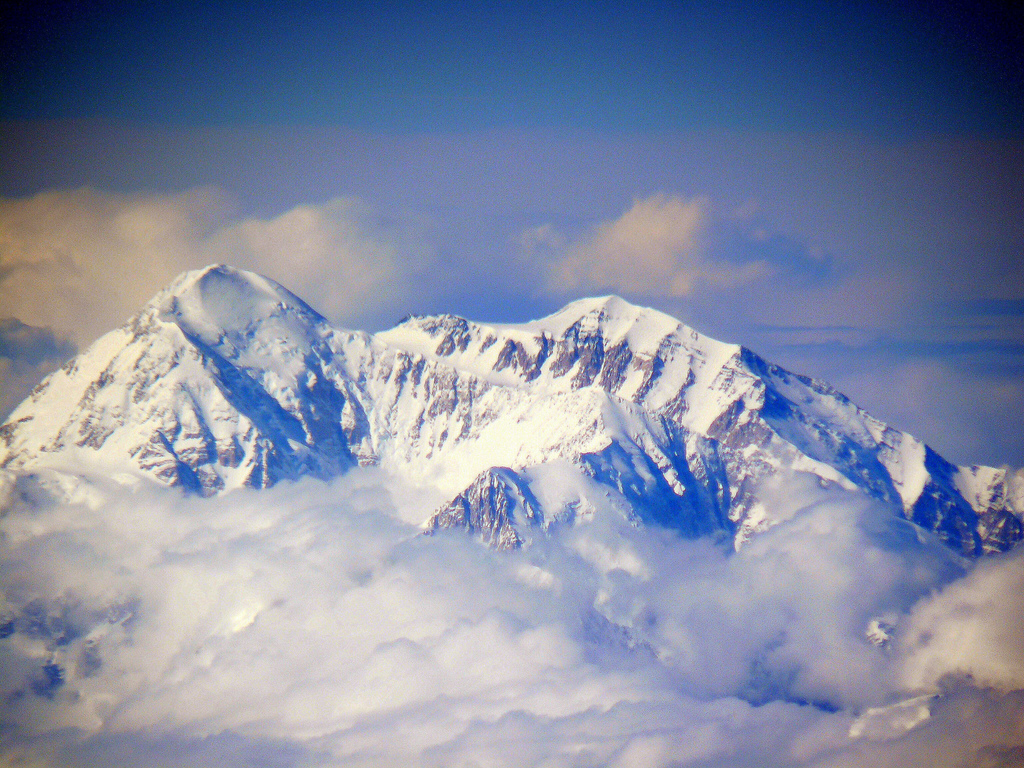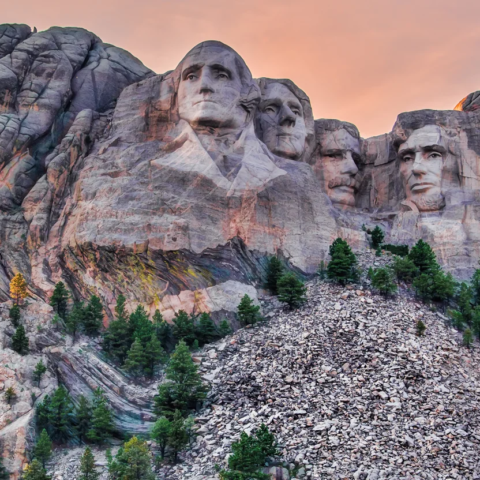Amid grizzly bears, frozen tundra, and the heat of a midnight sun rests Denali National Park. Situated in the interior of the Union’s 49th state, this majestic locale is home to one of the Earth’s incredible natural wonders, a mountain that ascends 20,237 feet above sea level. This protruding granite slab was lifted into the heavens by a tectonic collision between the Pacific and North American plates millions of years ago (a mere flash in the pan by geological time standards). It is surrounded by five snow covered glaciers that descend from both the northern and the southern peaks. 18,000 feet of the towering height is uninterrupted from the base to the southern peak, creating an incredible but lonely emergence from the surrounding landscape. This lonely peak is the highest point in North America and indubitably one of the most beautiful. If only it had a name.
For over 100 years there has been a dispute about whether the mountain should be called by the name given to it in the Athabascan tongue, Denali, or by the American name bestowed on it in the height of the 1896 election, Mount McKinley. McKinley is the name officially recognized by the US Board of Geographic Names. Denali is one of several names that native Alaskan tribes have been calling the mountain for centuries if not millennia. It is translated into English as “The High One” and since 1975, has been the official name of the mountain according to the Alaska Board of Geographic Names. This debate has made America’s last frontier an unlikely enemy: Ohio.
The home state of William McKinley, the United States’ 25th President, has led the charge to preserve their native son’s legacy. Representative Ralph Regula, R-Ohio, first raised his battle flag in 1975 when the Alaska State Legislature officially requested that the US Board of Geographic Names settle its differences with its Alaskan counterpart and make Denali official on the federal level. Regula exploited a legal loophole to block Alaska’s request. He filed pending legislation proposing that the Board make it impossible for the name to change from McKinley. When name change legislation is pending in Congress, the Board is legally prohibited from considering any requests from states. Regula used this tactic to keep Alaska at bay until his retirement in 2009. However, the mountain’s identity crisis had not yet ended.
In 2013, Senator Lisa Murkowski, R-Alaska, introduced federal legislation to change the name to Denali. Although she claimed to “have nothing against President McKinley whatsoever,” she was unsettled by the fact that he “never set foot in our state” and thought a change would be prudent. This erupted an old passion in the Ohioans. Representative Tim Ryan, D-Ohio, quickly countered Murkowski’s proposal with his own bill that honored “the legacy of this great American president and patriot” by keeping the mountain McKinley. Because of the pending legislation loophole, Murkowski’s bill cannot be considered by Congress. It looks like, for now, Alaska’s native people will not be granted their reprieve and will be forced to call the 20,237 foot titan “McKinley” at least a little longer.
This episode exemplifies society’s fascination with names and labels. It is very important to people that something is referred to in acceptable terms. Even wallets open in the name of naming. Publishers make millions every year selling baby naming guides to expectant mothers. Civil courts charge 65 dollars (plus sales tax and a filing fee) to the poor souls who are unhappy with what their parents wrote under the First Name heading on their original birth certificate. It is no wonder so much fuss is made about an enormous, iconic mountain when there is questionable satisfaction with personal naming.
And think naming North America’s tallest peak is difficult? Try a team in the National Football League. The Washington Redskins have recently been caught in a hellfire of controversy over the term “Redskins,” which some see as an offensive racial slur against American Indians. It is similar to the mountain controversy as American Indian heritage plays a leading role, but has generated considerably more national debate. Even Senate majority leader Harry Reid, D-Nev., weighed in on this controversy, siding with those who see it as disrespectful. Of course, as with the McKinley versus Denali debate, there are two sides to every story. Team President Bruce Allen is of the opinion that Redskins is an honorable term that “originated as a Native American display of solidarity” and, as of yet, has not made any effort to change the name.Like Denali, the Redskins controversy brings to light the hints of ethnocentrism that have historically defined the interaction between modern and Native American cultures. These controversies force Americans to question the role of the all important names and labels in a not quite post-racial society.
Names and labels are obviously important to people, but ultimately they carry little practical weight. What a New Yorker calls a “cookie” a Londoner might call a “biscuit.” The difference is not in substance, but in the words attached to it. It is the same with the mountain in Alaska. No matter what the US Board of Geographical Names says, a Native American can always call the mountain Denali while the rest of his countrymen and women call it McKinley. What something is called or how it is labeled does not in any way diminish its miraculous beauty. However, names do matter apart from the way they label the world. They represent attitudes. The Denali controversy is indicative of the callous superiority that modern culture has leaned toward since Christopher Columbus arrived to “save” Native Americans so many years ago.
Some deny that the naming controversy is a culture or racial issue at all. Representative Regula justified “McKinley” by proclaiming the President an American martyr who deserves a landmark and reminding Alaskans who owns the mountain. He said “The park and the mountain are federal lands, not state lands, and their maintenance is paid for by all Americans, not just Alaskans.” This may be well and true and certainly an owner should have the discretion to name property as he or she so chooses. But consider the tortured history of American Indians. When so much has been lost, does it not seem prudent for the United States to find another way to honor President McKinley?
As is often the case, this conflict is not about standardizing the name of a mountain. It is about a conflict that every human feels in their heart. It is about respect. There is certainly a divide between mainstream American culture and the folk culture of the Indians. When this divide exists, respect is not only expected, it is required. Are American Indians getting the respect they are owed when heritage that predates Columbus by 1,000 years is thrown away in favor of political expediency? They are not.
Modern culture has assimilated into much of the America and the countryside. The names Indians gave to the land are long forgotten. The reorganization of the continent by New World settlers has all but destroyed the Indian way of life that fashioned America for thousands of years.
There is still hope in the north. Alaska remains home to a considerable native population who maintain a distinct style of life. The wrongs perpetrated against the Indians cannot be taken back. But the future can still be shaped. Calling the mountain McKinley reeks of cultural arrogance. It is Denali and calling it that is much more important than the name itself. It is not just a show of respect but a symbol of the debt owed to North America’s native people and a reminder that no matter how much change is brought to a land and a people, their history is as a looming and eternal as the great Denali.
– Robert Oldham/Photo Credit: Flickr


